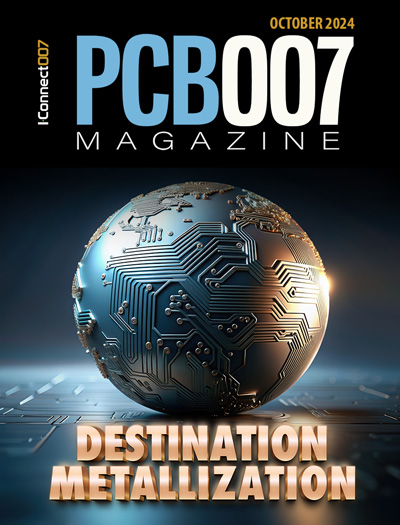-

- News
- Books
Featured Books
- pcb007 Magazine
Latest Issues
Current Issue
Inner Layer Precision & Yields
In this issue, we examine the critical nature of building precisions into your inner layers and assessing their pass/fail status as early as possible. Whether it’s using automation to cut down on handling issues, identifying defects earlier, or replacing an old line...

Engineering Economics
The real cost to manufacture a PCB encompasses everything that goes into making the product: the materials and other value-added supplies, machine and personnel costs, and most importantly, your quality. A hard look at real costs seems wholly appropriate.

Alternate Metallization Processes
Traditional electroless copper and electroless copper immersion gold have been primary PCB plating methods for decades. But alternative plating metals and processes have been introduced over the past few years as miniaturization and advanced packaging continue to develop.
- Articles
- Columns
Search Console
- Links
- Media kit
||| MENU - pcb007 Magazine
Despite Regional 200x Funding Differences, Post-Quantum Readiness Won’t Hinder eIDAS Unity
November 5, 2024 | ABI ResearchEstimated reading time: 2 minutes
Post-Quantum Cryptography (PQC) inevitably has an outsized impact on a technology remit covering many trust service use cases, with cryptographically robust signing acting as the market's core. Without this, there is no trust and, therefore, no Electronic Identification and Trust Services (eIDAS). According to ABI Research, a global technology intelligence firm, there are some regional risks to the implementation of this regulation and the extreme differences in Post-Quantum Research and Technology funding – with industry-leading countries such as France providing more than 200x the annual funding of the likes of Bulgaria and the Czech Republic – might be expected to widen the gaps. However, vendor confidence in regulation is strong, and security standards are mandatory for market entry.
“This is a nascent market, and it remains to be seen if early leaders will be able to maintain market dominance or if leapfrogging will change the landscape,” says Digital Security Research Analyst Georgia Cooke. “The key in the PQ market is adaptability, matching technical crypto agility with operational flexibility to keep up with a landscape which is liable to change.”
The challenge for vendors aiming to dominate the PQC market, which ABI Research predicts will surpass US$500 million by 2028, is significant. Providers across the technology stack must adapt to new standards. For example, cryptographic hardware security modules (HSMs), which serve as Qualified Signature Devices (QSCD) in this context, must be optimized to efficiently handle the new algorithms—a key task for companies like Entrust and Utimaco. Meanwhile, smart chips for electronic ID cards and passports must be redesigned to support longer and multiple keys, which is the responsibility of vendors such as NXP Semiconductors, HID Global, and Infineon. Additionally, providers like IDEMIA, IN Groupe, and Veridos are tasked with upgrading, digitizing, and ensuring mobile access to physical credentials, ensuring a smooth transition to PQC readiness.
Vendors can get ahead of the curve by proactively engaging with thought leadership, positioning themselves as the creators of best practices rather than followers. Thales, for example, even co-developed the Falcon algorithm selected by the U.S. National Institute of Standards and Technology (NIST) as a post-quantum-resistant digital signature standard.
“This is a complex ecosystem, with evolution needed throughout the stack in the face of new threats, and to achieve the vision of a seamless and unified eIDAS experience, the Post-Quantum Readiness strategy will need to be harmonized and strategic across regions, technical specialties and vendors,” Cooke concludes.
Suggested Items
Green Tech Accelerator: Tackling Water Resource Challenges and Unlocking Renewable Energy Opportunities
12/26/2024 | BUSINESS WIREGreen Tech Accelerator collaborates with startups, offering courses, mentorship, and international market strategies to implement and validate carbon reduction solutions. This Taiwanese initiative empowers SMEs to progress toward net-zero emissions.
Compal Adopts Intel Tech for Innovative Liquid Cooling Solutions
12/26/2024 | Compal Electronics Inc.Compal Electronics, a leading server solution provider, announced today its collaboration with Intel, BP Castrol (Castrol), JWS, and Priver to launch a groundbreaking liquid cooling solution based on Intel’s Targeted Flow technology. Designed specifically for high-density servers and AI data centers, this innovative solution aims to drive the industry toward a more efficient and sustainable future.
Biden-Harris Administration Announces CHIPS Incentives Award with Amkor Technology to Bring End-to-End Chip Production to the U.S.
12/25/2024 | U.S. Department of CommerceThe Biden-Harris Administration announced that the U.S. Department of Commerce awarded Amkor Technology Arizona, Inc., a subsidiary of Amkor Technology, Inc., up to $407 million in direct funding under the CHIPS Incentives Program’s Funding Opportunity for Commercial Fabrication Facilities.
SMT Mounter Market Size Projected to Reach $5.06 Billion by 2030
12/23/2024 | openPRAccording to the new market research report "Global SMT (Surface-mount Technology) Mounter Market Report 2024-2030", published by QYResearch, the global SMT (Surface-mount Technology) Mounter market size is projected to reach USD 5.06 billion by 2030, at a CAGR of 4.7% during the forecast period.
Apple’s Vision Pro Reshapes the VR/MR Landscape, Driving Applications from Entertainment to Productivity Tools
12/23/2024 | TrendForceTrendForce’s latest report estimates that global shipments of VR and MR headsets are expected to reach approximately 9.6 million units in 2024, representing a YoY increase of 8.8%.


